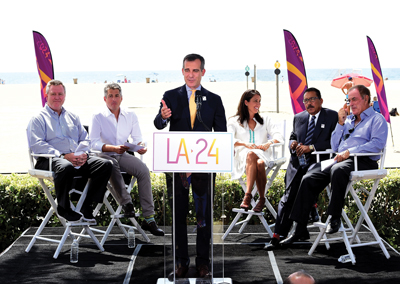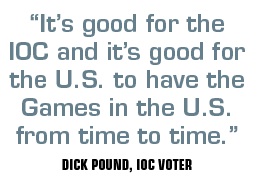The competition to host the 2024 Olympics will be a battle among geopolitical allies with much in common, a departure from recent trends that will put pressure on bid committees to creatively distinguish themselves.
Unlike recent campaigns that asked International Olympic Committee voters to do the unprecedented — bring the Olympics to South America, for instance — or choose between starkly different political and economic systems, bidders in the 2024 contest will try to outmuscle broadly similar colleagues: Los Angeles; Paris; Rome; Hamburg, Germany; and Budapest, Hungary.
 |
Los Angeles Mayor Eric Garcetti launches his city’s 2024 Olympc bid with (from left) USOC CEO Scott Blackmun, LA 2024 Chairman Casey Wasserman, Olympian Janet Evans, L.A. City Council President Herb Wesson and broadcaster Al Michaels.
Photo by: GETTY IMAGES
|
All five confirmed bid countries are NATO members with elected democratic governments. The World Bank considers each to be “high-income” countries, and all are majority white nations with rapidly changing demographics. Four of the five have hosted before, and all have decades of experience bidding on prior Olympics.
In that environment, votes could shift on more subtle aspects of a bid, and the politics of the IOC are harder to predict than ever. In many ways, the Switzerland-based IOC has already won by securing bids exclusively from developed democracies with reliable track records, several experts said.
“Even if they don’t ever say it, they’re glad they don’t have to go through another series of bids with China, Kazakhstan, things like that, where they get so much bad press from it,” said Bill Mallon, an author of Olympics history.
The field won’t officially be set until a Tuesday deadline, but latecomers appeared unlikely at press time. Toronto Mayor John Tory still could submit an application letter, but talks to win support from other Canadian politicians had made little progress with just days remaining. Potential bidders Baku, Azerbaijan, and Doha, Qatar, have backed off.
Despite the surface-level similarities, Los Angeles appears to have two clear selling points: The U.S. economic strength and the long-held belief, albeit entirely informal, that host duties ought to rotate among major regions of the globe. The U.S. hasn’t hosted a Games since Salt Lake City in 2002.
“It’s good for the IOC and it’s good for the U.S. to have the Games in the U.S. from time to time,” said Dick Pound, a Canadian and the second-longest-tenured IOC voter.
But when dealing with the IOC, Los Angeles doesn’t dare simply present itself as the long-overdue American bid. Los Angeles Mayor Eric Garcetti emphasized Hollywood and the beach in his announcement Sept. 1, looking to stand out culturally.
But, Pound noted, the other cities will leverage distinguishing characteristics, too. Paris would be celebrating a century since its last Games, and the Olympics likes to blend history with its modern marketing. Hamburg has made a bid to be a carbon-neutral Games, and Budapest would make an argument similar to Beijing’s and Rio’s: That it’s time to take a place on the world sport stage.
Powerful IOC President Thomas Bach encouraged the U.S. to keep a bid alive when Boston fell earlier this summer, so some believe he may continue pressing for Los Angeles as a demonstration that the IOC has mended fences completely with the U.S. following a long-term dispute over revenue sharing.
Others think the IOC may want to give the German president a home-country Olympics in 2024, which would be Bach’s final Games if he wins a new term in 2021.
Agenda 2020, Bach’s reform package, is supposedly going to loom large in IOC decision-making. But, as Pound noted, the 40-point reform plan is so diverse that different voters could both draw guidance from it and settle on radically different conclusions. Most Agenda 2020 commentary has focused on its purported desire for a more sustainable, affordable Olympics — which would benefit cities with existing infrastructure — but proponents of the successful build-from-scratch Beijing Winter Games justified their selection with the same reforms.
“I think we should approach Agenda 2020 with some healthy skepticism,” said Jules Boykoff, an Olympics researcher and professor at Pacific University.
Ultimately, the IOC wants a drama-free Games in the wake of Sochi, Rio and continuing crises surrounding a scrapped Olympic Stadium design and plagiarized logo for the 2020 Tokyo Games, Boykoff said.
“The prevailing sentiment is that Paris and L.A. are front-runners, because basically the IOC wants to have a very stable, noncontroversial Olympics and those two choices could possibly provide that,” Boykoff said, adding that Hamburg could make a comparable claim, too. Italy’s profound economic problems hurt Rome, he said.
Then there’s the wild card: future geopolitical events between now and the vote in September 2017. Among those questions are the future of the eurozone and the 2016 U.S. presidential election.





